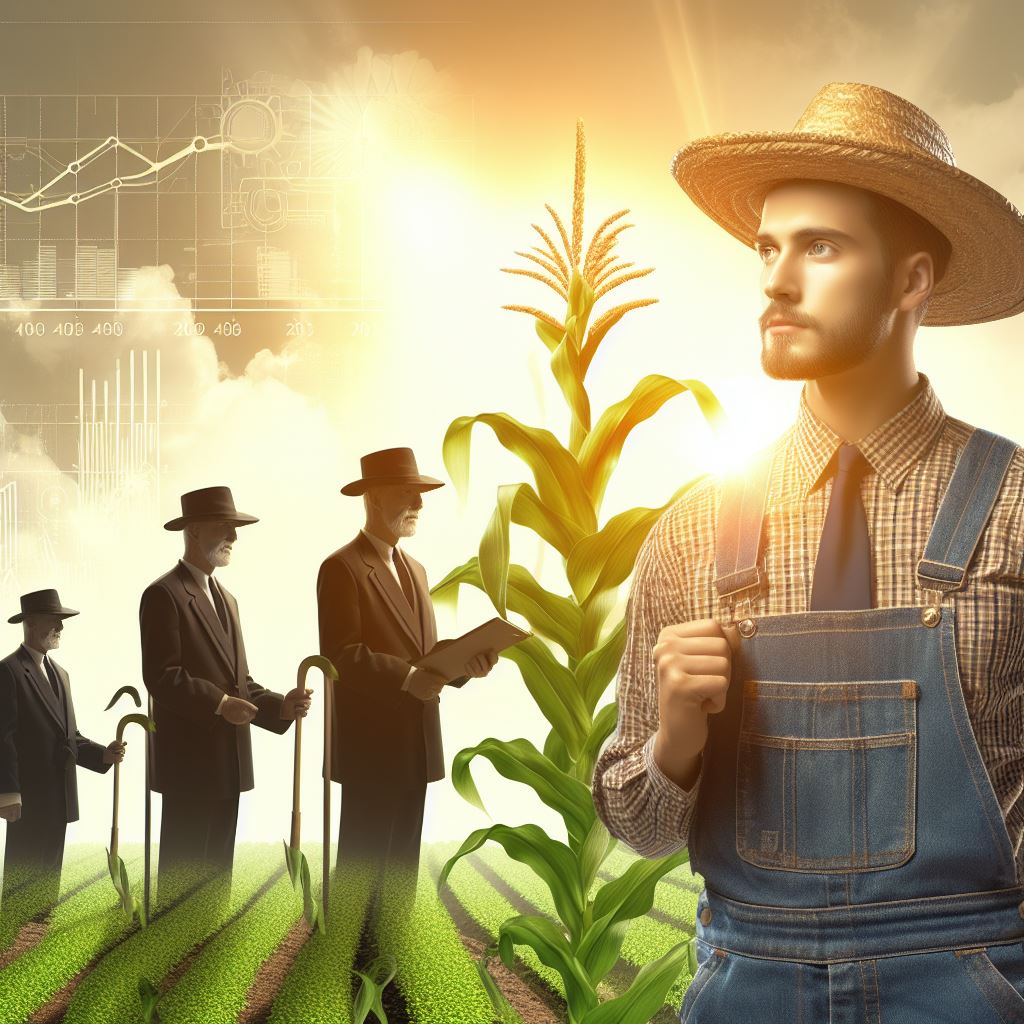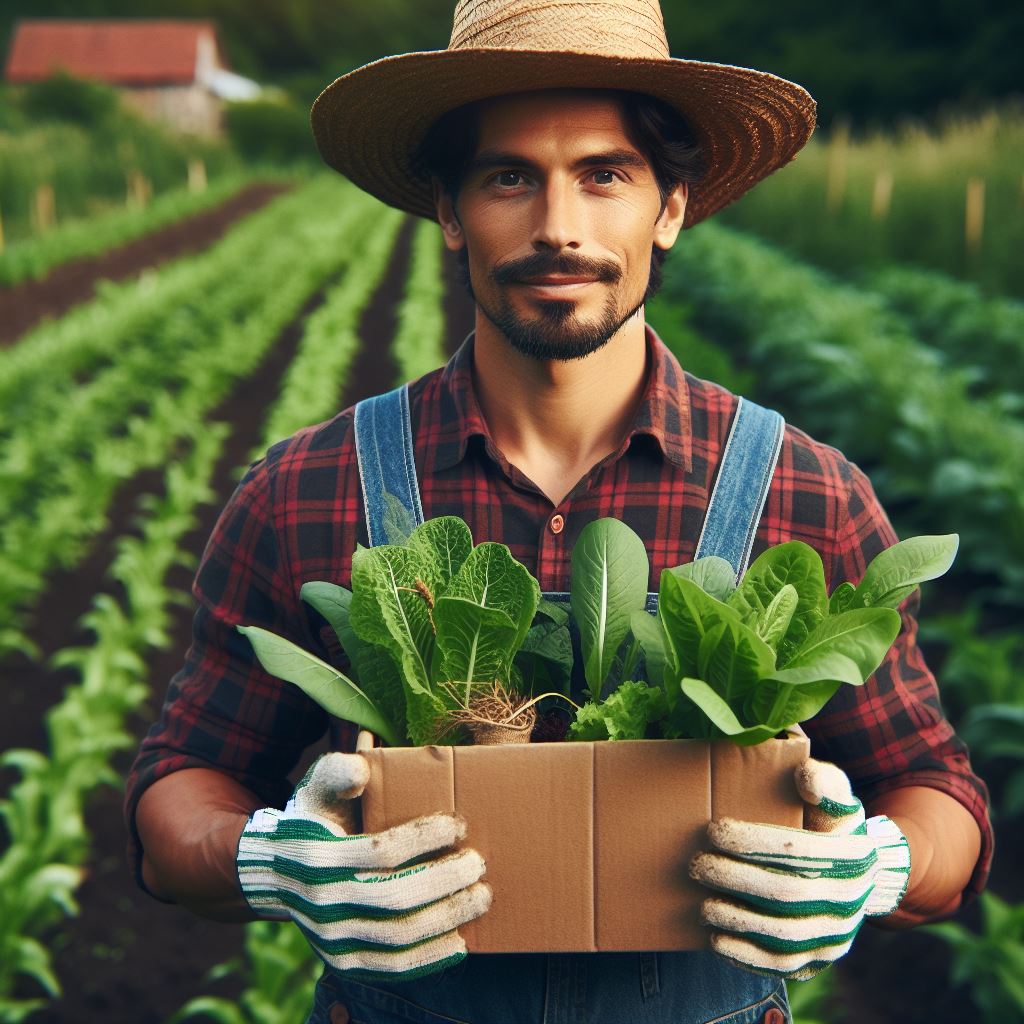Introduction
Delving into the rich history of 5th generation corn farmers, we uncover a legacy of agricultural expertise passed down through generations.
These farmers, spanning a century of dedication to cultivating corn, embody the resilience, innovation, and deep-rooted connection to the land that characterizes their profession.
The importance of exploring the journey of 5th generation corn farmers lies in understanding the enduring impact they have had on agriculture and rural communities.
Through their steadfast commitment and accumulated knowledge, these farmers have not only sustained their livelihoods but also contributed to the growth and prosperity of their regions.
Their story offers insights into the challenges, triumphs, and evolution of corn farming over the decades, shedding light on the vital role of multi-generational farming families in shaping agricultural practices and preserving agricultural heritage.
Historical background of corn farming
Origins and early practices
Corn farming has a long and fascinating history, dating back thousands of years.
- Native Americans were the first to domesticate corn, cultivating it as early as 7,000 BC.
- They developed various farming techniques, like intercropping beans and squash with corn, promoting soil fertility.
- Early corn farming involved planting the seeds by hand and using hand tools to cultivate the soil.
- Handpicking the corn ears from the tall stalks was a labor-intensive process.
Evolution of corn farming techniques over the years
Over time, corn farming techniques have continuously evolved, leading to improved efficiency and yield.
- The invention of the mechanical corn planter in the early 19th century revolutionized the planting process.
- By the late 19th century, horse-drawn cultivators replaced hand tools, allowing for larger-scale farming.
- Advancements in fertilizers and herbicides in the 20th century boosted corn production.
- Hybrid corn varieties developed in the 1920s significantly increased yields and disease resistance.
- Mechanized harvesting equipment, such as corn pickers and combines, were introduced in the mid-20th century.
- The use of genetically modified corn varieties in the late 20th century further enhanced productivity.
Corn farming has come a long way since its humble beginnings, transforming into a modern and technologically driven industry.
- Today, farmers utilize precision agriculture techniques, incorporating GPS and data analytics for optimal crop management.
- Automated irrigation systems and sensors help monitor soil moisture levels and reduce water usage.
- Corn farmers now practice conservation tillage methods to minimize soil erosion and preserve the environment.
- Biotechnology advances have enabled the development of genetically modified corn with traits like herbicide resistance and insect control.
- Modern corn hybrids are carefully selected for specific traits like drought tolerance or high yield potential.
The global importance and impact of corn farming cannot be understated.
- Corn is the most widely grown grain crop globally, with millions of hectares dedicated to its cultivation.
- It serves as a staple food for millions of people, plays a vital role in animal feed, and is a feedstock for the biofuel industry.
- The economic significance of corn farming extends beyond the agricultural sector, influencing food prices and trade markets.
Despite the challenges of climate change, pests, and market fluctuations, corn farmers have continuously adapted and thrived.
- They embrace new technologies and innovative farming practices to increase productivity and sustainability.
- Research institutes and agricultural organizations provide valuable support through scientific advancements and knowledge sharing.
- Collaboration between farmers and experts ensures continuous improvement in corn farming practices.
In short, the historical background of corn farming highlights the resilience and ingenuity of generations of farmers.
- From its origins as a Native American staple to the present-day highly mechanized and biotechnologically driven industry, corn farming has constantly evolved.
- Corn farmers continue to play a crucial role in feeding the world’s growing population and contributing to economic development.
Read: Dairy Farmer’s Journey to Sustainability
The significance of the 5th generation corn farmers
Their role in preserving and continuing the family tradition
- 5th generation corn farmers play a pivotal role in preserving and continuing the family tradition.
- They carry forward the invaluable knowledge and experience passed down through generations.
- These farmers exemplify the dedication required to maintain the legacy of their ancestors.
- The art of corn farming is handed down from parent to child, ensuring its longevity and cultural significance.
- By embracing their role, these farmers contribute to the preservation of agricultural heritage.
Challenges faced by 5th generation farmers in modern times
- 5th generation corn farmers face numerous challenges in today’s rapidly changing world.
- The increasing demand for technological advancements presents a learning curve for traditional farmers.
- Adapting to new farming techniques and equipment is crucial to remain competitive.
- Climate change poses a significant threat, requiring adaptation to unpredictable weather patterns.
- Sustaining profitability while facing rising costs of inputs, such as seeds and fertilizers, is demanding.
- Access to affordable and reliable labor becomes a challenge as traditional farming methods evolve.
- 5th generation farmers must navigate complex regulations and compliance standards.
- Market volatility and uncertain trade policies impact business decisions and profitability.
- Balancing tradition with innovation is a delicate matter for these farmers.
- Maintaining the integrity of their family’s heritage while embracing advancements in agriculture is vital.
In general, the significance of 5th generation corn farmers cannot be overstated.
Their role in preserving and continuing the family tradition is invaluable.
They carry forward the knowledge and experience passed down through generations, ensuring the longevity and cultural significance of corn farming.
However, these farmers face various challenges in modern times, from technological advancements to climate change and market volatility.
Adaptation, innovation, and balancing tradition with progress are necessary for their success.
Through their dedication and perseverance, 5th generation corn farmers leave a lasting impact on the agricultural industry.
Read: Maine Lobsterman’s Sustainable Practices

Explore Further: Urban Farming: Thriving in Tiny Spaces
Success stories of 5th generation corn farmers
Growing corn is not just a job for the 5th generation corn farmers, it is a way of life.
These farmers have dedicated their lives to the cultivation and growth of one of the most widely consumed crops in the world.
Through their hard work, perseverance, and innovative approaches, they have achieved remarkable success.
Profiles of notable 5th generation corn farmers
1. Achievements and innovations
John Anderson has been in the corn farming business for over 30 years.
He has pioneered the use of advanced irrigation techniques, allowing him to optimize water usage while maximizing crop yield.
By implementing precision agriculture technology, he has reduced fertilizer usage and increased overall efficiency.
Sara Thompson is renowned for her expertise in sustainable farming practices.
She has been instrumental in promoting diverse crop rotations and cover cropping, which helps in maintaining soil health and reducing the reliance on pesticides.
Sarah also introduced a unique method of weed control using organic mulch, significantly reducing herbicide usage.
2. Overcoming obstacles
Michael Roberts faced a major setback when his cornfield was hit by a devastating drought.
However, instead of giving up, he implemented a sophisticated rainwater harvesting system.
This allowed him to collect and store rainwater during the rainy season and utilize it during dry spells.
His determination and resilience ultimately led him to increase his corn yield by 20%.
Transform Your Agribusiness
Unlock your farm's potential with expert advice tailored to your needs. Get actionable steps that drive real results.
Get StartedKaren Brown encountered an outbreak of a destructive pest that threatened her entire corn harvest.
Instead of resorting to chemical pesticides, she developed a natural pest control method using beneficial insects.
By introducing ladybugs and lacewings into her fields, she successfully protected her corn crop and achieved healthy yields without harming the environment.
Community impact and contributions
Beyond their individual successes, 5th generation corn farmers have had a significant impact on their communities.
They have played an integral role in the local economy, providing employment opportunities and supporting other businesses in the area.
By actively participating in farmers’ markets and local events, they have encouraged community engagement and fostered a sense of pride.
These farmers have also been actively involved in philanthropic activities.
They have organized food drives and donations to help combat hunger in their communities.
Additionally, they have partnered with educational institutions to provide internships and scholarships, nurturing the next generation of aspiring farmers.
In a nutshell, the success stories of 5th generation corn farmers exemplify their commitment to innovation, resilience, and community development.
Through their achievements and determination, they have not only sustained their family legacies but also contributed to the broader agricultural industry.
Their impact will be felt for generations to come, ensuring a sustainable and thriving future for corn farming.
Read: Sowing Hope: Farming in Changing Climes
The future of corn farming
Sustainability practices and technologies
- As the fifth generation of corn farmers, embracing sustainability practices and technologies is crucial.
- Implementing precision agriculture techniques can optimize resource use while minimizing environmental impact.
- Using GPS and drones can help monitor crops, detect diseases, and apply fertilizers precisely.
- Adopting conservation tillage methods like no-till or strip-till can reduce soil erosion and improve water quality.
- Investing in renewable energy sources like solar power can make corn farming more sustainable in the long run.
- Transitioning to organic farming practices can meet the growing demand for organic corn products.
Potential challenges and opportunities for 5th generation farmers
- Climate change poses a significant challenge to corn farming, with increased frequency of extreme weather events.
- Developing resilience strategies, such as diversifying crops and investing in irrigation systems, is essential.
- Expanding corn-related businesses, such as ethanol production, can provide additional opportunities for revenue.
- With the growing interest in local and sustainable food, there is an opportunity for direct-to-consumer sales.
- Building partnerships with food manufacturers and distributors can help ensure a stable market for corn products.
- New technologies, such as genetic engineering, can offer improved crop traits and higher yields.
Importance of passing down knowledge and skills to the next generation
- Nurturing the next generation of corn farmers is vital for the continued success of the industry.
- Family traditions and values play a significant role in shaping the farming practices and work ethic.
- Knowledge transfer from older generations to younger ones ensures the preservation of tried-and-tested methods.
- Mentoring programs and agricultural education can equip aspiring farmers with the necessary skills and knowledge.
- Emphasizing the importance of innovation and adaptation will prepare future farmers for the changing agricultural landscape.
- Recognizing the importance of sustainable practices and promoting forward-thinking strategies is crucial for the next generation.
In closing, the future of corn farming lies in the hands of the fifth generation farmers.
By embracing sustainability practices and technologies, they can minimize environmental impact and optimize resource use.
However, they must also overcome challenges posed by climate change and seek new opportunities in the market.
Passing down knowledge and skills to the next generation ensures the industry’s continued success and prepares them for the evolving agricultural landscape.
Through collective efforts and innovation, 5th gen corn farmers can continue the century-long tradition of growth and contribute to a sustainable and prosperous future for the industry.
Read: Fencing Fields: A Sheep Farmer Diary
Conclusion
Recap of the significance of 5th generation corn farmers
- Fifth-generation corn farmers embody a century of resilience, innovation, and dedication to their craft.
- They have upheld family legacies, embracing technological advancements while preserving traditional farming values.
- Their stewardship of the land has sustained agricultural communities and contributed to global food security.
- Through their commitment to excellence, they have shaped the evolution of corn farming practices.
- Fifth-generation farmers serve as custodians of agricultural knowledge, passing down wisdom from one generation to the next.
Final thoughts on their century of growth and future prospects
Reflecting on their century of growth, fifth-generation corn farmers stand as pillars of agricultural sustainability.
Their adaptability and forward-thinking approach position them well for future challenges and opportunities.
As stewards of the land, they recognize the importance of environmental stewardship and sustainable farming practices.
Looking ahead, fifth-generation farmers remain committed to feeding the world while safeguarding natural resources.
Their resilience, innovation, and passion ensure that the legacy of corn farming will endure for generations to come.




